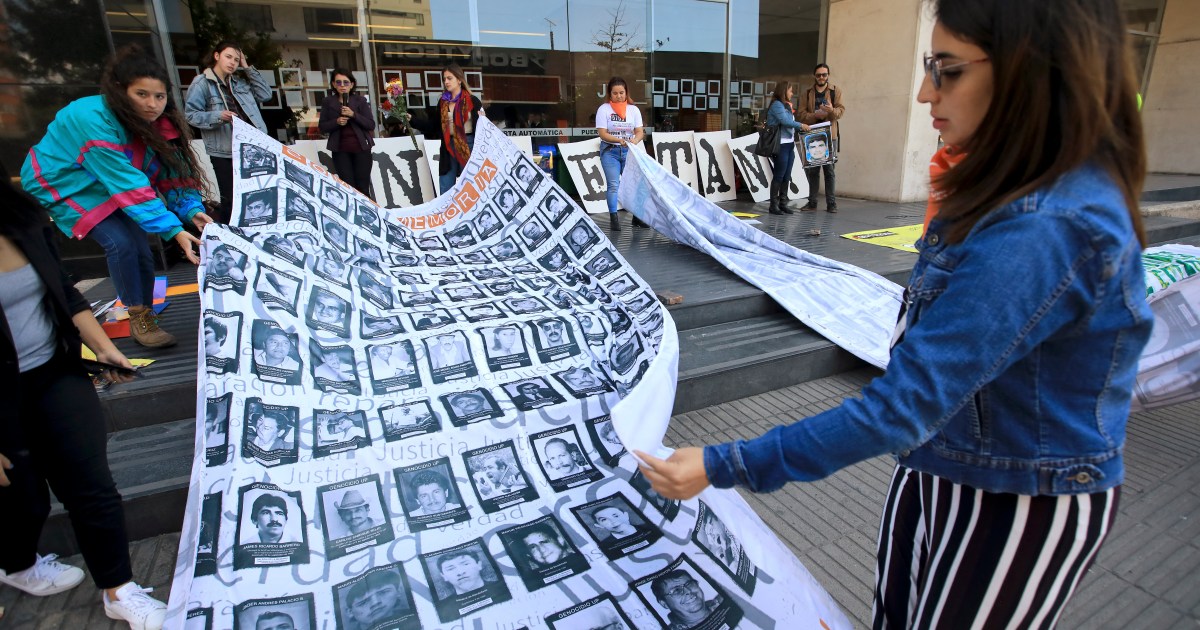Colombia: Former army officials admit role in killing civilians
Ex-army officials tell special tribunal they participated in so-called ‘false positive’ killings of over 100 civilians.
Ten former members of the Colombian military have publicly acknowledged their role in the 2007 and 2008 killings of more than 100 civilians, who were falsely portrayed as armed group members killed in combat with the army.
The admissions were made on Tuesday during an historic public hearing of the Special Jurisdiction for Peace (JEP) tribunal in the Norte de Santander department near Colombia’s border with Venezuela, where the killings took place.
The tribunal was created under a 2016 peace deal between the Colombian government and the now-demobilised Revolutionary Armed Forces of Colombia (FARC) rebels.
It is meant to try former combatants, doling out alternative punishments in exchange for full disclosure of incidents that took place during Colombia’s decades-long, internal armed conflict.
On Tuesday, a former military general, four colonels, five other army officials and one civilian said they participated in the kidnapping of 120 youth from the town of Ocana and neighbouring communities to kill and later present them as members of left-wing guerilla and other armed groups that operated in the area.
“I recognise and accept my responsibility as a co-perpetrator of these war crimes,” said Nestor Gutierrez, who was the corporal of the 15th mobile brigade when the killings occurred.
“We killed innocent people, peasants. I want to emphasise this: those we killed were simple peasants,” he said, adding that pressure from higher-ups and “demands for results” played a role in what happened.
The so-called “false positives” scandal has rocked Colombia, as the loved ones of the victims for decades have demanded justice and accountability – and insisted that their relatives were not involved with armed groups.
The JEP last year said the Colombian military carried out more than 6,400 of these extrajudicial killings between 2002 and 2008, when President Alvaro Uribe was in power. But rights groups and relatives have said the real number could be much higher.
Dozens of people – including around 50 relatives of the victims – attended Tuesday’s JEP hearing in Ocana, the latest opportunity for them to try to get some closure.
“I ask you to clear our family names … they were rural workers, not subversives, guerrillas and thugs as they were branded,” said Eduvina Becerra, the partner of Jose Ortega, a murdered farmer.
Judge Catalina Diaz described it as a “truth and accountability” hearing, saying the former military officials were expected to “clearly explain themselves, answer questions and most importantly, take direct responsibility in front of the victims and the country”.
“After years of silence and fear, the time for truth has finally arrived, to put an end to decades of impunity,” the JEP said in a video shared before the ex-military officials’ statements.
The tribunal has the authority to offer alternatives to jail time to people who confess their crimes and make reparations.
Al Jazeera’s Alessandro Rampietti, reporting from the capital Bogota, said “truly powerful” testimonials were delivered, offering relatives of the victims “the possibility to gain some truth of what happened”.
“The situation in [the region] is just one of many that the court has been investigating. They have been able to determine that more than 6,400 people have been killed this way by the military,” Rampietti said.
“Now the Colombian military has insisted that there wasn’t a systematic plan to kill innocent people”, he reported, but many former army officials that have spoken to the tribunal said they were under pressure from the government at the time “to show results”.
Tuesday’s hearing comes just weeks after the Colombian military was accused of killing at least four civilians during a late March operation in an Indigenous community that the army said targeted FARC dissidents.
Multiple survivors recently told Al Jazeera that the victims included 16-year-old Brayan Santiago Pama and local Indigenous leader Pablo Panduro Coquinche. The United Nations’ human rights body has urged Colombia to prosecute those responsible.




